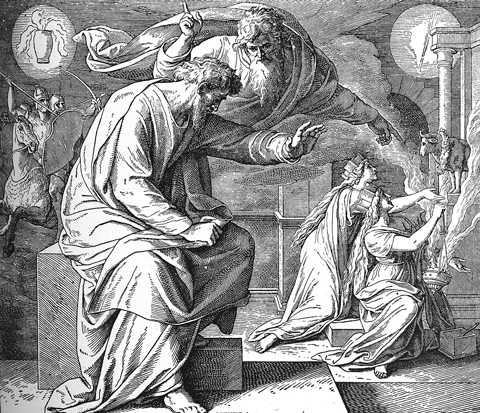In the name of Jesus. Amen.
This is a sermon on marriage. When I’ve preached on marriage in the past, I’ve offered a disclaimer, and I’m going to do that again today. This sermon isn’t intended to address all the different aspects of marriage. We’d be here for days and weeks. And this is a mixed audience. Many of you are currently married. Some have been through divorce. Some of you aren’t married, at least not yet. Some of you might never get married; know that Scripture says that remaining single is a good gift from God (see 1 Co. 7). And some of you have been married but are now widowed. You’ll hear in a minute that the reason being widowed is so hard is that you have, very literally, lost a part of yourself. To you, be comforted by Christ and the fact that your spouse will rise again (Jn. 11:23).
My intention with this sermon is show how marriage is God’s idea. Then, I’ll make four assertions about marriage to show how it is a good gift from God. Also, with those four assertions, I’d like to offer some Biblical advice for your marriage. If you have any questions about things I don’t address, feel free to ask me. So, with that said, are you ready?
When God created man (singular) in His image, He created them (plural) male and female (Gen. 1:27). Part of man (and here, please think ‘mankind’ or ‘humanity’) is to have a duality – two parts, or even better two persons. Scripture teaches that there is one God (Dt. 6:4), but three Persons – Father, Son, and Holy Spirit (Mt. 3:16-17; Mt. 28:19). The creation of man (again think ‘mankind) in the image of God is that man has a plurality which we see in Adam, the male, and the woman,[1] the female.
In Gen. 2:18-25, Scripture gives us the play-by-play of the creation of mankind as man and woman. But before the play-by-play we learn how in Gen. 1, God gave Himself a grade each day of creation. Day 1, God sees the light He created and sees that it is good – A+ (Gen. 1:4). Then, Days 2, 3, 4, and 5, God sees what He makes and it’s all good. A+’s all around (Gen. 1:10, 12, 18, 21, 25). Finally, on Day 6 God creates mankind to be the crown of His creation and sees that it was very good (Gen. 1:31) – A+++! But, again, Gen. 2:18-25 gives a little more insight into Day 6. God created Adam and decided it wasn’t good for Adam to be alone (Gen. 2:18). God wasn’t saying that because He made a mistake. He was saying that to show Adam the goodness of what He was about to do.
God put Adam to sleep, removes Adam’s rib (in Hebrew it’s literally Adam’s ‘side’), and from that chunk of Adam, God created Adam’s bride (Gen. 2:21-22). And Adam was really happy when he saw his bride. He said, “This at last is bone of my bones and flesh of my flesh; she shall be called Woman because she was taken out of Man” (Gen. 2:23). Then, we have the statement that gets quoted in this text from Eph., “Therefore a man shall leave his father and his mother and hold fast to his wife, and they shall become one flesh” (Gen. 2:24; Eph. 5:31).
So, from its beginning and institution, God made marriage to be one man, who has given of himself, to have a bride who is literally from his own flesh. Dear saints, this is what marriage is, and it doesn’t matter how the world might try to redefine it. This one man and one woman union, this way that husband and wife complement and complete each other is God’s design, God’s invention, and God’s very good gift to all mankind.
In a real way, we can say that everyone who has ever lived and will ever live is here because of marriage. Even if the conception and birth of a child happened without a marriage (and instead a distortion of it), that individual is procreated by a man and a woman engaging in an act that God gave as a gift for marriage. I’m keeping this sermon PG, but, again, if you have any questions about what I said there, feel free to talk with me.
Keeping in mind what marriage is, we can talk about these four assertions that Scripture makes about marriage.
First, every marriage is God’s work, God’s joining. Jesus plainly says this about marriage. He talks about a man leaving his parents and being joined to his wife and becoming one flesh. Then our Lord says, “What God has joined together, let not man separate” (Mt. 19:6; Mk. 10:9). To you who are married, remember this. Even when things get tough, even when you get into fights and arguments, even when you struggle, remind yourself, “God joined me to that person. My husband/my wife is God’s good gift to me.”
Second assertion, marriage is good. We already know this because God created the institution of marriage before He saw that everything He had made was very good – again that A+++ grade. But can we also see that marriage is good because of how the devil attacks it. I could spend weeks on how he attacks it, but I won’t. The devil hates marriage because he envies humans because we have the ability to procreate and he doesn’t (Mt. 22:30). Satan hates all marriages because they remind him of Christ and the Church. He also hates them because they are how children are procreated, which reminds him of God becoming flesh to crush his head (Gen. 3:15). So, the devil attacks marriage from all directions. Because marriage is good, Scripture’s advice to you who are married is this: defend your marriage against all attacks. Be in God’s Word together as a family. Be quick to forgive each other when you do wrong. Because of the Fall, marriages are built on the foundation of forgiveness. If your spouse does something wrong and apologizes, don’t just say, “Oh, that’s ok.” Instead, say, “I forgive you.” The words ‘sorry’ and ‘I forgive’ need to be normal, regular vocabulary in marriages.
That leads me to the third assertion. Marriage is hard work, but even that is good. It’s an delusion to think that the best marriages happen when a couple is ‘completely compatible’ with each other. It’s a delusion because we are sinners, and no two sinners are completely compatible. Sinners look out for their own interests and not the interests of others. So, in your marriages, sacrifice for each other and for your children. Don’t insist on your own way. Just as God took a chunk of Adam to create marriage, marriages are still a continual, sacrificial giving of self for the benefit of the spouse (Eph. 5:25).
Finally, fourth. Marriage is a mystery (Eph 5:32). We think we know what marriage is, but we can only scratch the surface of the mystery of marriage. Remember, God is the One who joins (Mt. 19:6; Mk. 10:9) a husband and wife together in marriage. It isn’t them making a choice to get married. God joins them, and God continues to join you to your spouse each and every day.
But the greatest mystery of marriage is that marriage is one of the ways that God manifests Himself. In marriage, God manifests Himself as the Groom of you, believer. You, the Church, are His bride. He gives Himself up for you. He sanctifies you, making you holy. He cleanses you by Baptism, by washing of water with His Word.
Dear Charlotte, today in your Baptism, God washed and cleansed you so that you would be His. Because of your Baptism, you are completely and totally unblemished. All you believers here today, God did that for you as well in your Baptism.
Dear saints, you are the unblemished Bride of Christ. The reason you are unblemished is that He has made you unblemished, and God doesn’t make mistakes. He doesn’t cut any corners. So, rejoice that you are His Bride. And strive to make His love for you the foundation upon which you build your marriage. The marriage feast of the Lamb is coming soon. Come, Lord Jesus. Amen.
The peace of God, which surpasses all understanding, will guard your hearts and minds in Christ Jesus (Php. 4:7). Amen.
[1] She isn’t given the name “Eve” until after the Fall in Gen. 3:20.










You must be logged in to post a comment.